The Graça Machel Trust has been running a Youth Advocates programme. This is a mentorship programme targeting young people from Malawi, Mozambique, Tanzania, and Zambia on how to champion Reproductive, Maternal, New-born, Child and Adolescent Health and Nutrition, (RMNCAH+N) in their countries. In this series we bring you the people behind the programme – the Youth Advocates themselves sharing their experiences and their journey.
Our first Youth Advocate to be featured is Kino Fernando Caetano Francisco Alberto from Mozambique.
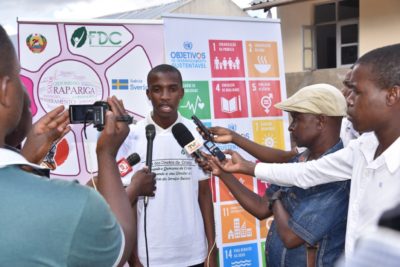
“It is good to work as a Youth Advocate, and my desire is not to stop. When I am older, I want to become a leader who will focus on the development of children, adolescents and young people, as well as vulnerable groups in my community.” – Kino Fernando Caetano Francisco Alberto, Mozambique
Why did you choose to be a Youth Advocate?
As a child I suffered from pneumonia and paralysis, I am only here today because I got access to good healthcare and doctors. This experience taught me very early the importance of good health care and made me develop an interest in ensuring vulnerable groups such as children, adolescents, and women get access to health care. To pursue my passion, I also became President of the Children’s Parliament in Mozambique and so the youth advocates programme came naturally.
What have been some of the benefits for you in being a youth advocate?
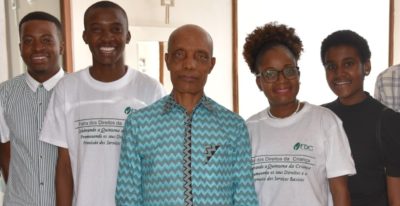
As a youth advocate, I have the opportunity to bridge the gap between young people and decision-makers, so the simple fact of defending the rights of adolescents and young people is a benefit. The other benefit has been the knowledge I have acquired through the work I have been doing with the communities.
Do you think this youth mentorship model works effectively, what have been some of the challenges?
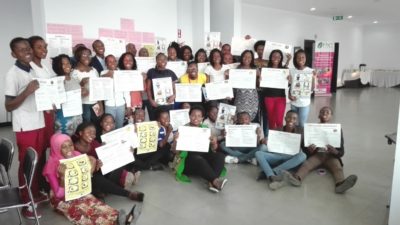
Yes, this model certainly works, because it asserts the participation of young people and makes them the main actors and agents of change.
Some of the key challenges I have identified are linked to improved communication between youth advocates and young people, especially in remote communities. There is a need to establish a permanent dialogue platform for young people, with a view to creating a mechanism for collecting problems and their solutions based on this interaction between youth advocates and other young people. Another challenge is the need to use local language for interaction with the youth and the people in the community, in order to ensure that the messages are well received.
Share some of the victories, highlights, and points of gratification from working as a youth advocate.
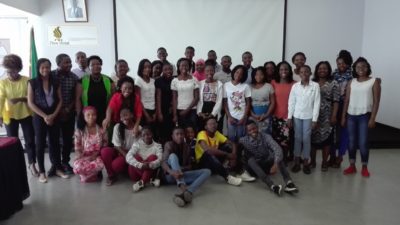
There have been a number of victories and highlights for me in this two year journey. Here are some of my most exciting points:
- Highlight: I participated in the process of signing the social commitment, which will be an instrument that will allow the acceleration of the priority actions of RMNCAH+N.
- Participation: Worked with the Trust to promote a Day of the Girl Child Campaign. This was very inspiring for me since it helped raise awareness on issues affecting girls.
- Gratification: It was gratifying to moderate important panels throughout the National Conference of the Girl and have the opportunity to record a video demonstrating against child marriage.
- Success: For me success was to share with the Governor of Nampula the wishes of the young people and watching him now working towards addressing the issues I presented.
Any advice to other young people who might want to become Youth Advocates?
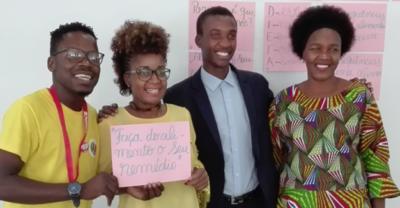
Young people who want to become a youth advocate should be patient and persistent, as the process of advocacy and policy influence in favor of young people takes time and requires calmness, patience and persistence. The work of youth advocates must be driven by the will to see a better world for the young people, because without the drive you will get tired and the work will be in vain. We have to believe that it is possible together to solve the problems that affect us.
Read more on our Children’s Rights Programme










 The Trust supports and mobilises civil society networks on issues of ending child marriage, ending violence against children, ending female genital mutilation and promoting children’s rights, to carry out advocacy and action across Africa. Special focus is placed on Malawi, Mozambique, Tanzania and Zambia where child marriage continues to be a problem largely driven by poverty, gender inequality, harmful traditional practices, conflict, low levels of literacy, limited opportunities for girls and weak or non-existent protective and preventive legal frameworks.
The Trust supports and mobilises civil society networks on issues of ending child marriage, ending violence against children, ending female genital mutilation and promoting children’s rights, to carry out advocacy and action across Africa. Special focus is placed on Malawi, Mozambique, Tanzania and Zambia where child marriage continues to be a problem largely driven by poverty, gender inequality, harmful traditional practices, conflict, low levels of literacy, limited opportunities for girls and weak or non-existent protective and preventive legal frameworks.




 Education is a fundamental right for all children, which is also a vehicle for social, economic and political transformation in communities, countries and the African continent at large. Recent studies indicate a lack of progress in some of the critical commitments aimed at improving education quality, access, retention and achievement, particularly for girls. In most African countries, girls may face barriers to learning, especially when they reach post-primary levels of education. By implementing multi-dimensional approaches to education which includes core education, personal development, life skills and economic competencies, the Trust partners with funding partners, governments, civil societies and the private sector to improve education access.
Education is a fundamental right for all children, which is also a vehicle for social, economic and political transformation in communities, countries and the African continent at large. Recent studies indicate a lack of progress in some of the critical commitments aimed at improving education quality, access, retention and achievement, particularly for girls. In most African countries, girls may face barriers to learning, especially when they reach post-primary levels of education. By implementing multi-dimensional approaches to education which includes core education, personal development, life skills and economic competencies, the Trust partners with funding partners, governments, civil societies and the private sector to improve education access.

 The Nutrition and Reproductive, Maternal, New-born, Child and Adolescent Health and Nutrition, (RMNCAH+N) of the Children’s Rights and Development Programme aims at promoting the Global Strategy for women, children and adolescents’ health within the Sustainable Development Goals (SDG) agenda. The strategy emphasises on the importance of effective country leadership as a common factor across countries making progress in improving the health of women, children and adolescents.
The Nutrition and Reproductive, Maternal, New-born, Child and Adolescent Health and Nutrition, (RMNCAH+N) of the Children’s Rights and Development Programme aims at promoting the Global Strategy for women, children and adolescents’ health within the Sustainable Development Goals (SDG) agenda. The strategy emphasises on the importance of effective country leadership as a common factor across countries making progress in improving the health of women, children and adolescents. Through its Early Childhood Development (ECD) plan, The Trust will seek to put into action the new science and evidence Report that was presented by Lancet Series on Good and early development – the right of every child. This will be achieved by mobilising like-minded partners to contribute in the new science and evidence to reach all young children with ECD. The Trust’s goal is to be a catalyst for doing things differently, in particular, to rid fragmentation and lack of coordination across ECD sectors. In response to evidence showing the importance of political will in turning the tide against the current poor access and quality of ECD. Even before conception, starting with a mother’s health and social economic conditions, the early years of a child’s life form a fundamental foundation that determines whether a child will survive and thrive optimally.
Through its Early Childhood Development (ECD) plan, The Trust will seek to put into action the new science and evidence Report that was presented by Lancet Series on Good and early development – the right of every child. This will be achieved by mobilising like-minded partners to contribute in the new science and evidence to reach all young children with ECD. The Trust’s goal is to be a catalyst for doing things differently, in particular, to rid fragmentation and lack of coordination across ECD sectors. In response to evidence showing the importance of political will in turning the tide against the current poor access and quality of ECD. Even before conception, starting with a mother’s health and social economic conditions, the early years of a child’s life form a fundamental foundation that determines whether a child will survive and thrive optimally.